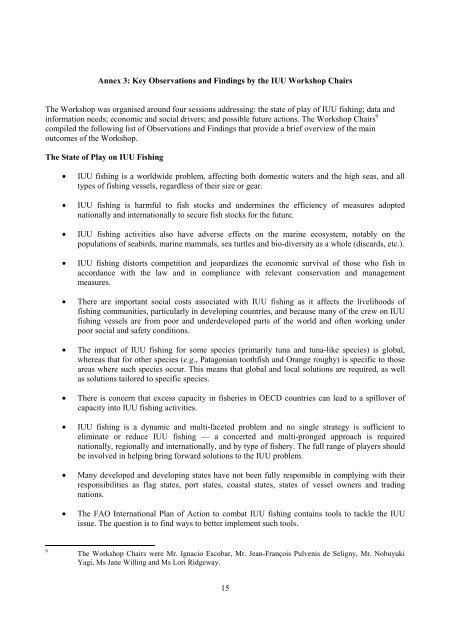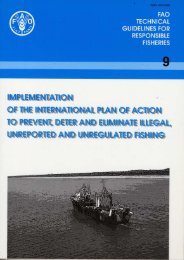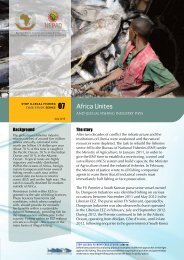1 Addressing Illegal, Unreported and Unregulated (IUU ... - OECD
1 Addressing Illegal, Unreported and Unregulated (IUU ... - OECD
1 Addressing Illegal, Unreported and Unregulated (IUU ... - OECD
You also want an ePaper? Increase the reach of your titles
YUMPU automatically turns print PDFs into web optimized ePapers that Google loves.
Annex 3: Key Observations <strong>and</strong> Findings by the <strong>IUU</strong> Workshop ChairsThe Workshop was organised around four sessions addressing: the state of play of <strong>IUU</strong> fishing; data <strong>and</strong>information needs; economic <strong>and</strong> social drivers; <strong>and</strong> possible future actions. The Workshop Chairs 9compiled the following list of Observations <strong>and</strong> Findings that provide a brief overview of the mainoutcomes of the Workshop.The State of Play on <strong>IUU</strong> Fishingxxxxxxxxxx<strong>IUU</strong> fishing is a worldwide problem, affecting both domestic waters <strong>and</strong> the high seas, <strong>and</strong> alltypes of fishing vessels, regardless of their size or gear.<strong>IUU</strong> fishing is harmful to fish stocks <strong>and</strong> undermines the efficiency of measures adoptednationally <strong>and</strong> internationally to secure fish stocks for the future.<strong>IUU</strong> fishing activities also have adverse effects on the marine ecosystem, notably on thepopulations of seabirds, marine mammals, sea turtles <strong>and</strong> bio-diversity as a whole (discards, etc.).<strong>IUU</strong> fishing distorts competition <strong>and</strong> jeopardizes the economic survival of those who fish inaccordance with the law <strong>and</strong> in compliance with relevant conservation <strong>and</strong> managementmeasures.There are important social costs associated with <strong>IUU</strong> fishing as it affects the livelihoods offishing communities, particularly in developing countries, <strong>and</strong> because many of the crew on <strong>IUU</strong>fishing vessels are from poor <strong>and</strong> underdeveloped parts of the world <strong>and</strong> often working underpoor social <strong>and</strong> safety conditions.The impact of <strong>IUU</strong> fishing for some species (primarily tuna <strong>and</strong> tuna-like species) is global,whereas that for other species (e.g., Patagonian toothfish <strong>and</strong> Orange roughy) is specific to thoseareas where such species occur. This means that global <strong>and</strong> local solutions are required, as wellas solutions tailored to specific species.There is concern that excess capacity in fisheries in <strong>OECD</strong> countries can lead to a spillover ofcapacity into <strong>IUU</strong> fishing activities.<strong>IUU</strong> fishing is a dynamic <strong>and</strong> multi-faceted problem <strong>and</strong> no single strategy is sufficient toeliminate or reduce <strong>IUU</strong> fishing — a concerted <strong>and</strong> multi-pronged approach is requirednationally, regionally <strong>and</strong> internationally, <strong>and</strong> by type of fishery. The full range of players shouldbe involved in helping bring forward solutions to the <strong>IUU</strong> problem.Many developed <strong>and</strong> developing states have not been fully responsible in complying with theirresponsibilities as flag states, port states, coastal states, states of vessel owners <strong>and</strong> tradingnations.The FAO International Plan of Action to combat <strong>IUU</strong> fishing contains tools to tackle the <strong>IUU</strong>issue. The question is to find ways to better implement such tools.9The Workshop Chairs were Mr. Ignacio Escobar, Mr. Jean-François Pulvenis de Seligny, Mr. NobuyukiYagi, Ms Jane Willing <strong>and</strong> Ms Lori Ridgeway.15
















